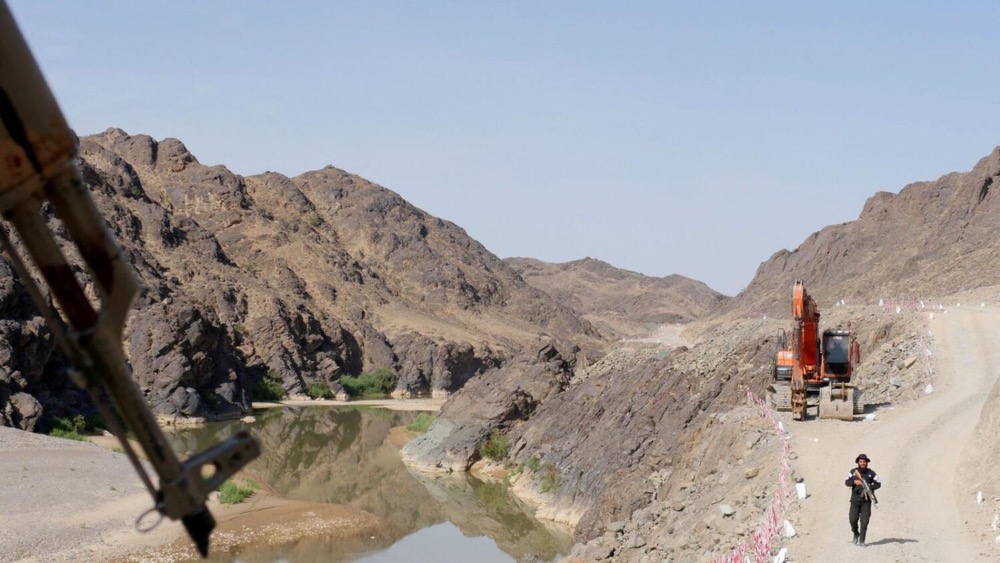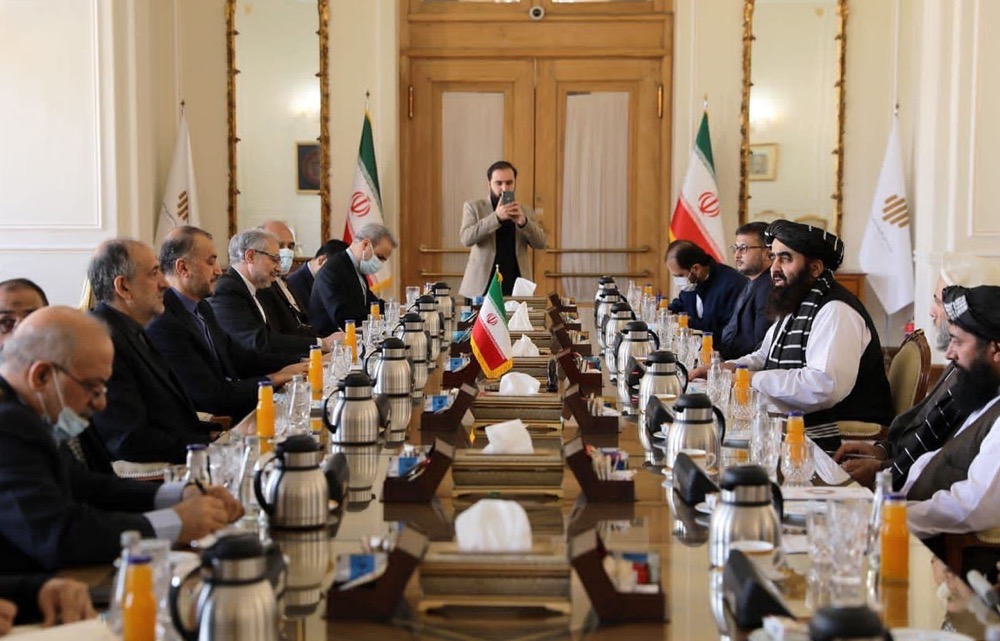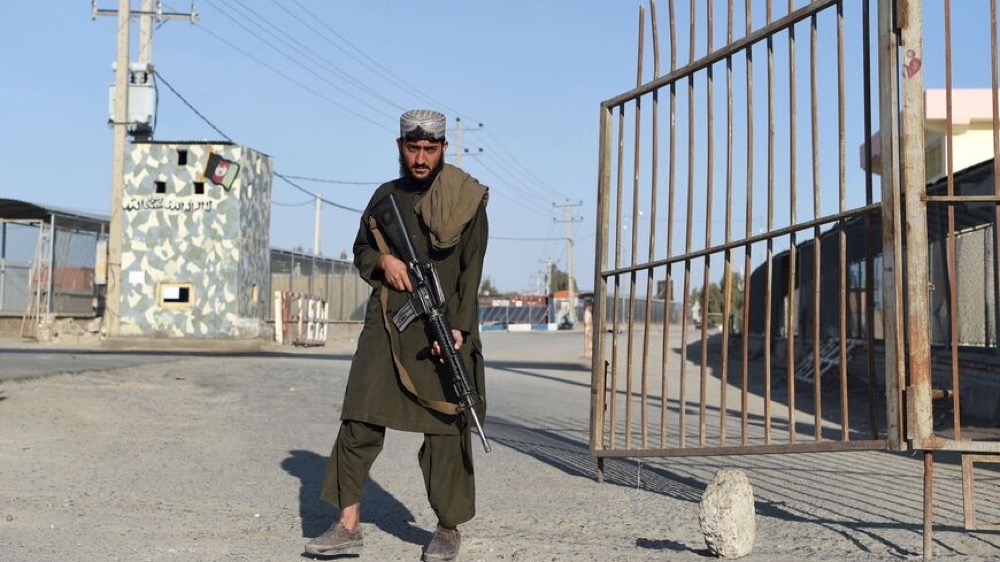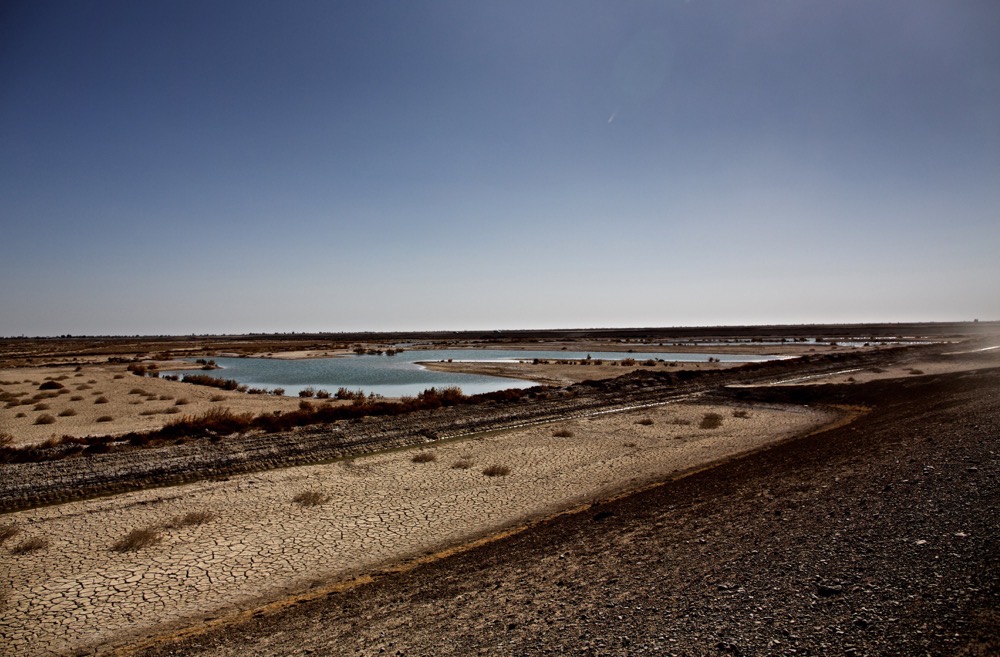KABUL: Tensions between Afghanistan and Iran escalated over the weekend after a heavy exchange of gunfire near a border post that killed at least three people and wounded several others. The clash appeared to have its roots in a simmering dispute over the rights of the two neighbors to their shared water resources.
On Sunday, reports indicated that the fighting between the Iranian and Afghan border security forces had eased, with both sides engaging in talks to defuse tensions. Analysts say countries of the region, especially Afghanistan, can ill afford a conflict, which could begin with the kind of gun battle that the Sasuli border post in Iran just witnessed, but end with regional powers picking sides.
The burst of belligerence comes just weeks after Iranian President Ebrahim Raisi warned the Taliban not to violate Iran’s water rights over their shared Helmand River, as laid out in a bilateral treaty signed in 1973.
The waters of the Helmand, which is over 1,000 kilometers long and flows from Afghanistan into Iran’s arid eastern regions, have been a matter of concern for Tehran because of Kabul’s decision to dam it to generate electricity and irrigate agricultural land.

A Taliban official at the Bakhshabad Dam. (AFP)
Iran has faced increasing water scarcity issues in recent years. The situation prompted protests by farmers in 2021, when an estimated 97 percent of the country was facing some level of drought, according to the Iran Meteorological Organization.
The issue of Helmand water sharing was discussed on May 18 between Amir Khan Muttaqi, Afghanistan’s acting foreign minister, and his Iranian counterpart Hossein Amirabdollahian.
Again on Saturday, Muttaqi met Hassan Kazemi Qom, the Iranian ambassador, in Kabul, to discuss bilateral relations, including water issues.
“The minister of foreign affairs also noted that issues between the two sides can be better resolved through mutual dialog and understanding,” Afghan Foreign Ministry’s deputy spokesman said on Twitter.
Muttaqi had said earlier in the week that the Taliban “remains committed” to the 1973 treaty, while adding that “the prolonged drought in Afghanistan and the region should not be ignored.”

Iranian FM Hossein Amir-Abdollahian during a meeting with his Afghan counterpart Amir Khan Muttaqi. (AFP)
As Afghanistan faces its third year of drought, the country was ranked third on a 2023 emergency watchlist issued by the International Rescue Committee, which highlighted how climate change contributes to and compounds the crisis in the country.
Addressing the residents of Sistan and Baluchestan, Muttaqi said Afghanistan “shares your pain equally.”
In a statement issued on May 22, he said: “I call on the government of Iran not to politicize this vital issue of water. It is optimal for us to resolve such issues through understanding and direct talks instead of making remarks in the media.
FASTFACTS
• Drought has blighted Iran for 30 years, but has worsened over the past decade.
• Iran Meteorological Organization says 97% of the country faces some level of drought.
• An estimated 79% of Afghan households lack sufficient water for their daily needs.
“During the last two years, the Islamic Emirate of Afghanistan has taken steps to resolve controllable problems; however, the force majeure that exceeds human capacities (due to climate change) must be understood and a solution found accordingly.”
Within days, however, tensions between the two countries over water sharing had reached boiling point. Taliban officials accused Iran of opening fire first on Saturday morning along the border of Afghanistan’s Nimroz province and the Iranian province of Sistan and Baluchestan.

A Taliban fighter stands guard at the entrance gate of Afghan-Iran border crossing bridge in Zaranj. (AFP)
“Today, in Nimroz, Iranian border forces fired toward Afghanistan, which was met with a counterreaction,” Abdul Nafi Takor, a spokesman for the Afghan Interior Ministry, said in a statement issued on Saturday night.
He said that the firefight killed two people, one from each country, adding: “The situation is under control now. The Islamic Emirate of Afghanistan does not condone the clashes.”
Iran, for its part, accused the Taliban of shooting first, with state-run IRNA news agency quoting the country’s deputy police chief, Gen. Qasem Rezaei, as condemning the “unprovoked attack.” IRNA also said Iran inflicted “significant damage and casualties.”
Two Iranian border guards were killed while two civilians were injured in the clash, according to IRNA, which also reported that the situation was under control by Saturday night.
“The Islamic Emirate considers dialog to be a reasonable way for any problem,” Enayatullah Khawarazmi, the Afghan defense ministry spokesman, said in a statement.
“Negative measures and looking for excuses for war are not in the interest of either side.”
The spike in Afghan-Iranian tensions over water rights comes amid accumulating disagreements between the two regimes since the Taliban took control of Afghanistan in 2021, including previous clashes at their borders and reports of mistreatment of Afghan refugees.
Though Iran does not officially recognize the Taliban administration, it has maintained relations with Afghanistan’s new rulers.
For decades, Iran hosted millions of Afghans fleeing armed conflict in their war-torn country, and the number of Afghans crossing west has increased since 2021.
Almost 600,000 Afghan passport holders live in Iran and about 780,000 are registered as refugees, according to 2022 data from the UN High Commissioner for Refugees, while 2.1 million Afghans remain undocumented.

A general view of Hamoon wetland. (AFP)
Tensions surrounding refugees threatened to break out into violence several times, including in January this year, when reports of mistreatment widely circulated on social media, prompting Taliban officials to raise their concerns with Tehran over the difficulties faced by Afghan refugees in Iran.
Iranian security forces have “unlawfully killed” at least 11 Afghans, according to a report by the rights monitor Amnesty International published last August, which also documented the forced returns and torture of Afghans.
Even so, as friction between the neighbors flares up, Afghanistan is likely to seek a resolution of the problems through negotiations, according to Geneva-based Afghan analyst Torek Farhadi.
“The Taliban will avoid a standoff with Iran,” he said in a statement shared with Arab News. “Afghanistan is fragile itself after 40 years of war … history has shown Afghanistan is better off solving challenges with neighbors through talks.”
Any conflict between Afghanistan and Iran would have implications for the region, Farhadi said, adding that China’s geopolitical role and relations with the Taliban government may also come into play.
Like Tehran, Beijing too has not officially recognized the Taliban government. However, it has welcomed Taliban representatives and engaged in various talks, while also keeping its embassy open in Kabul.
“China wants a secure Afghanistan in order to have access to Afghan minerals and it also wants access to Iran’s oil and gas through Afghanistan,” Farhadi said.
“China would be unhappy with developments that would compromise the newfound stability in Afghanistan (and) will advise the Taliban not to escalate armed hostilities with Iran.”


























